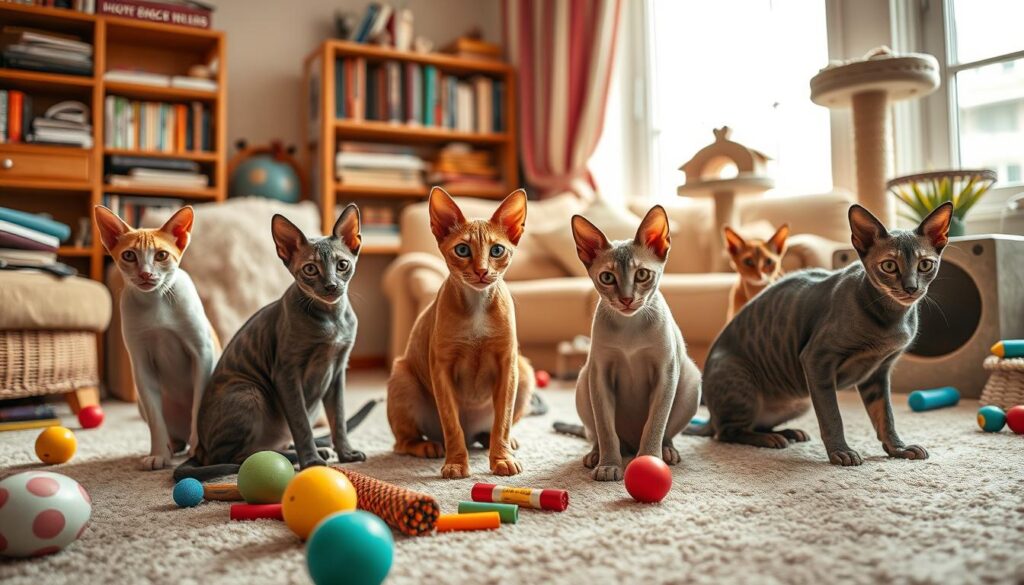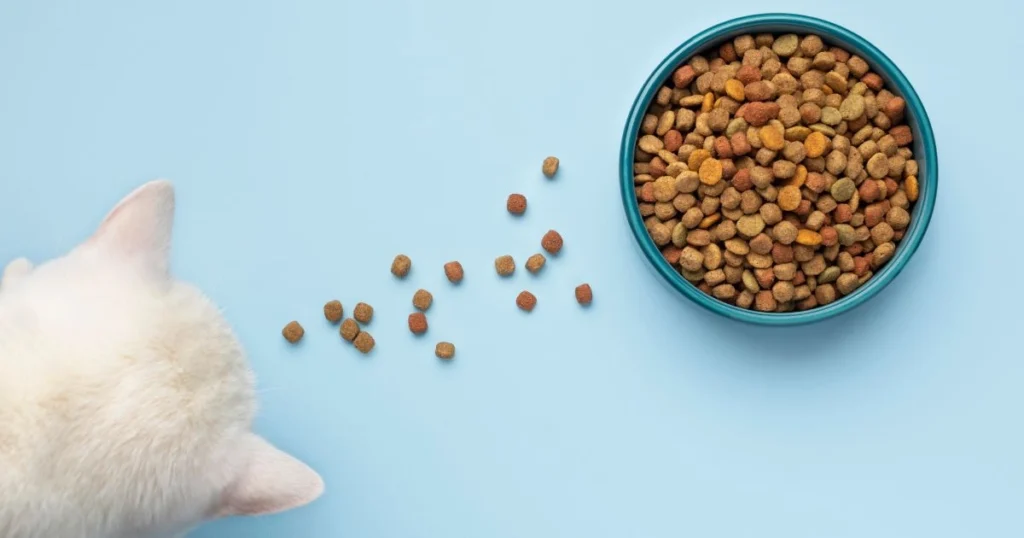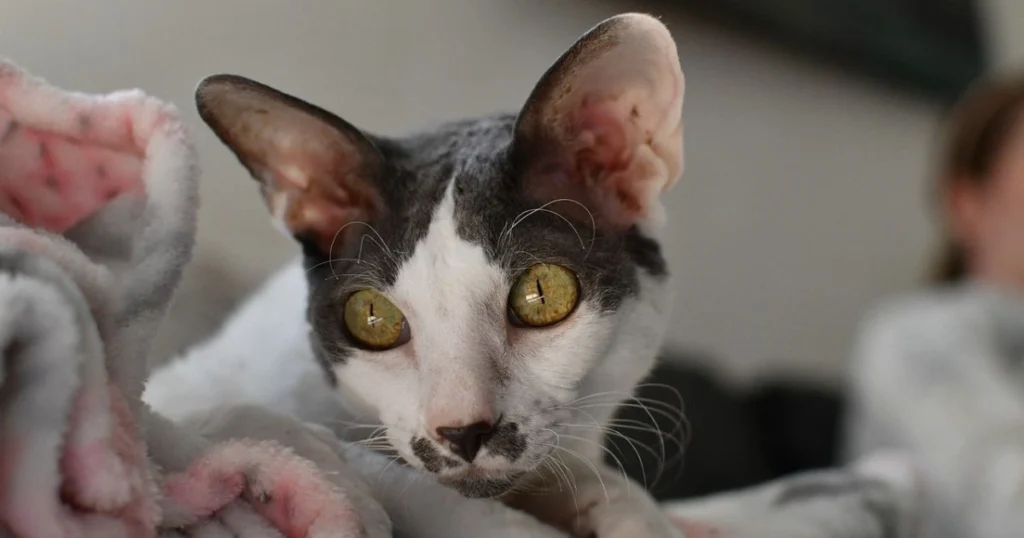Why Cornish Rex Cats Are Loved for Their Unique Curly Coats
Table of Contents
I’ve always loved cats, and the Cornish Rex really stands out. Their curly coats, big ears, and sweet nature make them special. They quickly become your best friends.
Even though they’re small, weighing 5 to 10 pounds, Cornish Rex cats have big hearts. They live for 15 to 20 years, giving you plenty of time to bond with them. With over 40 colors and patterns, every Cornish Rex is unique, making them a favorite among cat lovers.
Overview of the Cornish Rex Breed
The Cornish Rex is a unique cat breed known for its curly coat and friendly nature. It started in 1950 with a kitten named Kallibunker from Cornwall, England. These cats are known for their slender bodies, arched backs, and warm touch, winning many hearts.
History of the Cornish Rex
The Cornish Rex breed comes from a special tortoiseshell cat named Serena. She had a kitten named Kallibunker with a curly coat. This kitten was the start of the Cornish Rex breed.
In the 1950s and 1960s, the breed needed more genetic variety. So, they crossed it with other cats like Siamese and Russian Blues. This helped keep the breed healthy and diverse.
Key Characteristics of Cornish Rex Cats
- Soft, curly coat that requires minimal grooming
- Slender, muscular body with an arched back
- Warm body temperature
- Highly intelligent and social personality
- Low-shedding, making them a popular choice for rex mutation and pedigree cats enthusiasts
Cornish Rex cats stand out with their curly coats. They are also smart and don’t shed much. These traits make them great pets for many people.
The Unique Curly Coat of Cornish Rex
Cornish Rex cats are known for their curly coats. This trait is due to a genetic mutation that breeders have worked on for years. Unlike most cats, they have only soft, downy undercoat hair, without the outer and middle layers.
What Causes the Curly Coat?
The curly coat of Cornish Rex cats comes from a genetic mutation. This mutation changes how hair follicles grow, leading to only the soft, down hair on their bodies. While not hypoallergenic, they shed less than many breeds, which is good for those with allergies.
Coat Care Tips
- Regular baths help keep their skin and coat healthy and soft.
- Use a soft-bristle brush or a damp cloth for grooming to protect their down hair.
- They might need baths more often than other cats to keep their coat looking great.
Knowing how to care for a Cornish Rex’s curly coat is key. It helps keep them looking and feeling their best.
| Breed | Price Range | Coat Characteristics |
|---|---|---|
| Cornish Rex | $800 – $1,200 | Unique curly undercoat, no outer layer |
| Devon Rex | Up to $2,000 | Curly, wavy coat, similar to Cornish Rex |
Temperament and Personality Traits
Cornish Rex cats are known for being active, affectionate, and quirky. They are like kittens all their lives, full of energy. They love being around people and other pets.
What to Expect from a Cornish Rex
Cornish Rex cats are smart and can learn tricks. They talk a lot, making fun conversations with their owners. They love to play, whether it’s chasing or hiding.
Social and Playful Nature
- Cornish Rex cats are very loving and close to their families.
- They love being around people and enjoy cuddling.
- These cats stay playful and energetic, even when they’re older.
- Cornish Rex cats get along well with other pets, like dogs, if they’re introduced right.
Cornish Rex cats have curly coats and charming personalities. They are active, affectionate, and quirky. This makes them great friends, bringing joy and fun to their owners.
Health Considerations for Cornish Rex Cats
Cornish Rex cats are generally healthy. But, they can face certain genetic health issues. It’s key to know these risks and take steps to keep your cat healthy. Regular vet visits and preventive care are crucial.
Common Health Issues
Some health problems in Cornish Rex cats include:
- Autosomal Dominant Polycystic Kidney Disease (AD-PKD) – This inherited condition can lead to kidney damage over time.
- Progressive Retinal Atrophy (PRA) – This genetic vision disorder can cause blindness in Cornish Rex cats within 3-4 years after the signs appear.
- Hypertrophic Cardiomyopathy (HCM) – This prevalent heart disease can make it difficult for the heart to pump blood effectively.
- Neonatal Isoerythrolysis (NI) – This condition can be fatal for affected kittens within a few days of birth.
- Vitamin-K-Dependent Coagulopathy – This genetic disorder can affect the blood clotting ability of Cornish Rex cats.
- Feline Infectious Peritonitis (FIP) – This often-fatal viral disease is a concern for Cornish Rex cats.
- Deafness – Some genetic lines of Cornish Rex cats may be susceptible to hearing loss.
- Patellar Luxation – This condition, where the kneecap dislocates, is more common in Cornish Rex cats.
- Skin Problems – Cornish Rex cats may experience yeast infections, itchiness, thinning or balding coat, and sunburn.
- Dystocia – Some Cornish Rex cats may require C-section delivery due to difficulties giving birth.
Preventive Care Practices
To keep your Cornish Rex healthy, focus on preventive care. This includes:
- Regular veterinary check-ups to monitor for any potential health issues
- Genetic testing to identify and manage inherited conditions
- Proper nutrition and diet to support your Cornish Rex’s overall wellbeing
- Grooming and bathing to maintain the health of their unique coat and skin
- Providing a safe, enriched living environment to meet their needs
By being proactive, you can ensure your Cornish Rex cat has a happy and healthy life.
Training Your Cornish Rex Cat
Cornish Rex cats are special. They are smart and can learn quickly. This makes them great for training and learning tricks. With the right method, you can teach your Cornish Rex cat many skills. This will keep them happy and strengthen your bond.
Basic Commands and Tricks
Cornish Rex cats love positive rewards like treats and praise. Keep training sessions short, about 5-10 minutes. This keeps them focused and interested. Clicker training is also good for clear communication and learning.
- Start with simple commands like “sit,” “shake,” and “high five.” Be patient and use positive rewards.
- Teach fun tricks like fetching or walking on a leash. Cornish Rex cats enjoy challenges and spending time with their owners.
- Play and solve puzzles with your cat. This keeps their mind active and prevents boredom.
Litter Box Training Tips
Litter box training is easy with Cornish Rex cats. They are clean and like to please. Here are some tips:
- Start with the litter box early and always praise and reward them for using it.
- Find a litter your cat likes. They might have their own preferences. Try different types until you find the right one.
- Keep the litter box clean. Scoop it often and change the litter when needed. Cornish Rex cats like a clean place.
Training your Cornish Rex cat is rewarding. They are smart and love to learn. With patience and positive rewards, you can unlock their full potential.

Living Environment for Cornish Rex Cats
Creating a warm, comfy, and cat-friendly home is key for Cornish Rex cats. They are very sensitive to cold and hot temperatures. So, keeping them indoors is best for their health.
Ideal Home Setup
Cornish Rex cats love a cozy, warm home. They need soft blankets, heated beds, and warmth, especially when it’s cold. They also enjoy climbing, so add high perches and cat trees to your home.
Indoor vs. Outdoor Living
Indoor living is best for Cornish Rex cats because they can’t handle the weather. Cold or hot weather can harm them. Keeping them indoors helps control the temperature and keeps them safe.
These cats are friendly and get along well with other pets or kids. They are playful and need a warm, interactive home. This makes them great companions.
Nutrition Needs of Cornish Rex Cats
Cornish Rex cats are full of energy and curiosity. They have a high metabolism and love to eat. To keep them healthy, they need a balanced diet that meets their special needs. Knowing what food is best for them is key to their well-being.
Recommended Diet for Optimal Health
Cornish Rex cats need a diet full of protein, fats, and carbohydrates. They also need important vitamins and minerals. It’s best to feed them high-quality, protein-rich cat food made for their active lifestyle.
Make sure to watch how much food they eat. Cornish Rex cats can get too fat if they don’t get the right amount of food.
Understanding Food Labels
- When picking cat food for your Cornish Rex, check the ingredient list and nutritional info.
- Choose cat food with animal-based proteins like chicken, turkey, or fish. These are important for your cat’s health.
- Make sure the food has healthy fats like omega-3 and omega-6. These help keep their skin and coat healthy.
- Stay away from cat foods with too many carbs, fillers, or artificial preservatives. These can harm your Cornish Rex’s health.
By knowing what your Cornish Rex needs and choosing the right food, you can help them stay healthy and full of energy all their lives.

Grooming Your Cornish Rex
Cornish Rex cats are easy to groom because of their curly coats. They don’t need a lot of brushing or baths. But, regular grooming is key to keep their skin and coat in top shape.
Bathing and Brushing
Cornish Rex cats usually only need a bath when they get really dirty. Their single-layered coat gets less dirty than double-coated breeds. Use a mild, cat-safe shampoo and make sure to rinse well. Gently pat them dry to prevent dry skin.
Brushing them a few times a week helps spread their natural oils and removes loose hairs. Use a soft-bristle brush or a grooming glove to be gentle on their sensitive skin.
- Cornish Rex cats shed less than most cats because they have only one layer of fur.
- They are not hypoallergenic, as they still shed some fur and dander that can cause allergies.
- For grooming, use a soft brush to keep their skin oils balanced, trim their nails regularly, and clean their ears with a damp cloth.
“Cornish Rex cats do not require special grooming and are one of the best breeds for low-maintenance coat care.”
Understanding the Cornish Rex’s Playful Nature
Cornish Rex cats are known for their lively and curious nature. They love interactive play and mental stimulation. This keeps them active and sharp. Playing games and using fun toys can satisfy their curiosity and love for adventure.
Fun Games to Play
Cornish Rex cats are great at catching things. Try tossing a small toy or ball and give them a treat when they return it. Playing a game of chase with a toy on a string is also fun. They’ll love to pounce and play.
Interactive puzzle toys are another great idea. They need to figure out how to get treats, which keeps their minds busy.
Toys That Stimulate Their Curiosity
- Wand toys with feathers or ribbons that they can swat and jump at
- Puzzle feeders that challenge them to work for their food
- Catnip-infused toys that engage their senses
- Vertical scratching posts and cat trees to satisfy their natural climbing instincts
Offering a variety of interactive play and mentally stimulating toys is key. This way, your Cornish Rex will stay happy, healthy, and engaged at home.
“Cornish Rex cats are true companions, constantly seeking our attention and involvement. Engaging them in play not only satisfies their natural curiosity but also strengthens the bond between us.”
Adoption and Purchase Considerations
Looking for a Cornish Rex cat? It’s key to find a good breeder or shelter. Reputable breeders should share health test results for autosomal dominant polycystic kidney disease (AD-PKD) and progressive retinal atrophy (PRA). Ask about the cat’s health, personality, and how well it’s been socialized before you decide.
Adopting a Cornish Rex from a shelter is another great option. It gives a loving home to a cat in need. It also helps fight pet overpopulation and supports cat adoption efforts.
Finding a Reputable Breeder or Shelter
- Do your homework on breeders and look for those in good cat breeding organizations.
- Make sure the breeder shares health and genetic test results for the parents and kittens.
- Check out the breeder’s place to see how the cats are cared for and socialized.
- Check out local shelters and rescue groups that focus on Cornish Rex cats for adoption.
Questions to Ask Before Adopting
- What’s the cat’s health history, and have any health issues been fixed?
- How has the cat been socialized, and what’s its personality like?
- How old is the cat, and how long has it been in the shelter or rescue?
- What does the adoption fee cover, like spay/neuter, shots, and microchipping?
- Are there any extra steps or rules for the adoption process?
By thinking carefully and asking the right questions, you can find a Cornish Rex that fits your life and home. This ensures a fulfilling and responsible breeding or adoption experience.
The Lifespan of a Cornish Rex Cat
Cornish Rex cats are known for their curly coats and loving nature. They are also among the longest-living cat breeds. On average, they live between 15 to 20 years. Some even live beyond 20 years.
Factors Influencing Lifespan
Several things affect how long a Cornish Rex cat lives. These include their genes, diet, exercise, and health care. Regular vet visits, a good diet, mental games, and a safe home are key. They help your Cornish Rex live a long, healthy life.
Tips for Longevity
- Feed your Cornish Rex a high-quality, balanced diet. This is because they have a fast metabolism.
- Play with your Cornish Rex often. This keeps them physically and mentally sharp.
- Take your Cornish Rex to the vet regularly. This helps catch health problems early.
- Make a safe, indoor space for your Cornish Rex. They love to explore and play.
- Groom your Cornish Rex often. This keeps their special coat healthy and looking good.
By following these tips, you can help your Cornish Rex live a long, happy life. They will be a loving member of your family for years to come.
“Our Cornish Rex, Whiskers, just celebrated his 18th birthday, and he’s still as playful and energetic as ever. With the right care, these cats can truly be lifelong companions.”
Why You Should Consider a Cornish Rex Cat
The Cornish Rex cat is a standout with its curly coat and engaging personality. These cats bring many benefits to a home. They are affectionate, have low-shedding coats, and are quickly becoming popular pets.
Benefits of Owning a Cornish Rex
Cornish Rex cats are social and playful, making great companions. They form strong bonds with their owners and enjoy interactive play. Their short, curly coats also need little grooming, making them a low-maintenance pet.
Personal Testimonials and Experiences
Many owners love their Cornish Rex cats for their affection and ability to get along with others. Sarah says, “My Cornish Rex, Lila, is the most loving and energetic cat I’ve ever owned. She loves to play fetch and cuddle up with me on the couch. I couldn’t imagine my home without her unique and lively presence.”
Michael also shares his experience, “Adopting our Cornish Rex, Leo, was one of the best decisions we’ve made. He’s incredibly intelligent, social, and gets along wonderfully with our young children. The low-shedding coat is an added bonus that makes him a perfect fit for our family.”
FAQ
What are the key features of Cornish Rex cats?
Cornish Rex cats stand out with their curly, soft fur. They have big ears and long legs. They weigh 5-10 pounds and live 15-20 years.
Where did the Cornish Rex breed originate?
The Cornish Rex breed started in 1950 in Cornwall, England. A kitten named Kallibunker was the first with curly fur.
What causes the curly coat of Cornish Rex cats?
Their curly fur comes from a genetic mutation. They have only soft, short down hair. This is different from most cat breeds.
What is the temperament of Cornish Rex cats?
Cornish Rex cats are playful and energetic. They love being around people and other pets. They’re smart and can learn tricks.
Are Cornish Rex cats prone to any health issues?
Yes, they can get certain health problems. These include kidney disease and eye issues. They might also react differently to some medicines.
How can I train a Cornish Rex cat?
They’re very smart and can learn tricks. Use positive methods to train them. They love playing fetch and learning commands.
What is the ideal living environment for a Cornish Rex?
They do best indoors because they’re sensitive to cold. They need a warm place and might need extra blankets. They love climbing and exploring high places.
How much grooming do Cornish Rex cats require?
They need less grooming than many breeds. But, they might need baths to keep their skin clean. Gentle brushing helps keep their fur in good shape.
How can I find a reputable Cornish Rex breeder or shelter?
Look for a good breeder or shelter. A good breeder will share health info. Ask about the cat’s health and personality. Adopting from a shelter is also a great option.
What is the average lifespan of a Cornish Rex cat?
Cornish Rex cats live 15-20 years. Their health, diet, and care affect their lifespan. Regular vet visits and a balanced diet help them live longer.

Cornish Rex: From Kitten to Senior Age (The Ultimate Feline Care Guides) Paperback – March 25, 2021

